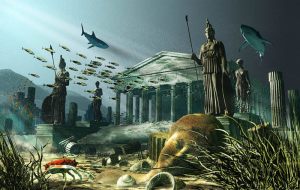This is almost my finished Houdini version of my landscape before I render it and put it into photoshop to add the final detail. I am really pleased with what I have managed to produce using Houdini as I really struggled to learn the programme at first and felt I was never going to grasp it, however I have surprised myself and I am very pleased with my progress.
Category Archives: 2nd Year – 3D Graphics
Adding Texture and Lighting
Here I have added a range of textures to improve the realness of my landscape. I added sand to my floor and glass to my bubbles. I found this made my bubbles look more realistic and their shadow was clear with just an outline. Over all I am very pleased with my textures.
I wanted the lighting to create an erie effect with the light above focusing on the city and then fade into darkness of the sea. I aded a blue tint on the light to give it a dark deep water feel.
Adding Basic Colour
Getting Started
This is my first attempt at building my landscape in Houdini. I started off with the buildings, I decided to stick to a basic shape building as I want to keep it simple.
After adding my buildings and moving to how I wanted them positioned I have started to add other elements to my landscape. I wanted the floor to be uneven like sand and I have also added bubbles by creating spheres and positioning them to float up and get bigger in size. I feel so far I have done well and started to get my head around Houdini.
Sketch idea
Research – Atlantis
I have been looking into Atlantis to help improve my ideas for my own under water city.
Atlantis is the subject of a legend about an advanced island civilization that was destroyed or lost. Stories about Atlantis are first mentioned in Plato’s dialogues Timaeus and Critias, in which characters say it was destroyed by an earthquake or a tsunami about 9,000 years before the time in which Plato wrote. The story claims Atlantis was somewhere outside the Pillars of Hercules. According to Plato, the story originated with Ancient Egyptian priests.
Some people believe that the stories are fictions made up to serve the purposes of Plato’s dialogs. But others take them as if they were serious historical accounts.
There have been dozens — perhaps hundreds — of locations proposed for the classical Atlantis. Some are more-or-less serious attempts at legitimate scholarly or archaeological works; others have been made by psychic or other pseudoscientific means. As continental drift became better understood and accepted during the 1950s, most “Lost Continent” theories of Atlantis have been proven conclusively false.
Some cultures have “lost civilization” myths. In some cases, it has been argued that there is a common historical event or real “lost civilization” at the root of some or all of these legends, but there is considerable disagreement between the competing hypotheses. It may be that these legends have arisen from many different historical events, and are only just now being associated by modern theorizers because of their similarity. It may also be that these legends are entirely fictional, but for some reason have arisen and remained popular in many different cultures at different times.
Research- looking into under water cities
3D landscape chosen idea
3D landscape
For my 3D graphics assignment I have to create a abstract landscape in Houdini and add the last detail in photoshop. I have been thinking and looking into different ideas but one that I wish to do is an under water city.










